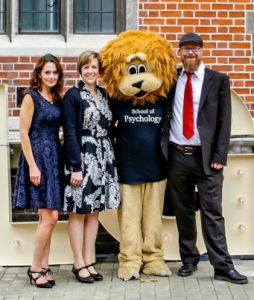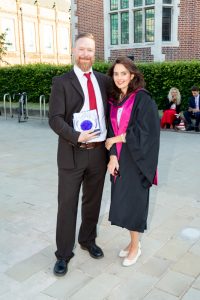As part of our Demystifying Leadership blog series, we’ve chatted to staff in a variety of leadership positions across the Faculty. To help you find out more about what a Head of School role might be like, I spoke to Professor Gwyneth Doherty-Sneddon about her job as Head of the School of Psychology in FMS.
What are your main responsibilities in your role?

I lead and manage the School of Psychology. My role is quite diverse, but it primarily focuses on the learning and teaching experience. I work with approximately 35 academic members of staff (whom I manage directly) and about 11 or 12 admin staff to run and deliver a number of Undergraduate, Postgraduate Taught and Professional Training programmes under the School of Psychology.
What does an average day look like for you?
I don’t think there is an average day, to be quite honest. The largest amount of my time is spent strategically, making sure our School’s teaching plan is on track, and working with external organisations to ensure we have the right partnerships in place and that we’re developing new professional placements for students.
Another important part of my role is the leadership and mentoring of staff (academics, in particular). I review their personal development and manage any day-to-day issues, as well as the relationships between them. Due to the School’s recent growth in student numbers, I’m also often shortlisting or interviewing new academics to teach.
What do you enjoy most about your role?
I particularly enjoy the mentoring of staff. Since beginning working with them, I’ve seen a number of them be very successful and receive promotions on the basis of learning and teaching. This makes me particularly happy, as it shows the University values the learning and teaching advancement process.
Additionally, as I know my staff very well, I’m able to look strategically at the School to find projects that would be well-suited to the skill set of a certain staff member. So, to then see them flourish in that project makes me very happy.
What made you want to apply for the role?
At the time, I was an associate Dean for Research at Faculty-level in another institution, where I managed research across a diverse range of disciplines. I had been looking to get back into my own discipline again, so this leadership role was perfect, and I’ve really enjoyed being back in Psychology. I also knew the University wanted this School to grow, so I was excited that there was real opportunity to make a lot of big changes.
What do you think is your biggest achievement so far in your role?

As a result of our growth as a School, the University has invested in a state-of-the-art learning and teaching space within a new building. It will include specialised teaching spaces, such as a forensic laboratory and a psychological therapies clinic. It will be a fantastic environment for all our students and staff.
I feel these new resources are a symbol of our recent success and the University’s belief and trust in me.
What learning opportunities have been available to you in your role?
In much of my career previous to this role, I’ve had to learn on the job, through trial and error, which has been a massive challenge. But within this role, I have done a senior leadership course, which was quite useful, and also a mentoring course, where I did learn a lot, even about myself.
Have you been supported by colleagues, mentors or training opportunities?
I feel extremely supported by the University and the Faculty, and there are some very approachable people with real integrity here. The PVC has been very willing to listen and develop strategic plans. I couldn’t have grown the School to in such a way had the University not resourced more academic posts and invested in a new building for us. This makes me feel as though I’ve been listened to and I’ve been trusted to drive this growth.
The previous Undergraduate Dean (Jane Calvert) has also been fantastic and she was my go-to person when I needed a sounding board. The Heads of other Units also provide peer support and we regularly talk and share advice. Finally, I get a lot of day-to-day support from my colleagues in my school, with whom I have very good relationships and are always there to help with whatever I need.
What has your role taught you about yourself?

My current role has taught me how good I am with people. In my previous job, I was trying to manage 400 people and was never able to get to know them as individuals. So, at Newcastle, I’ve had the chance to realise that I work very well with individuals when I can get to know them, and that I am able to bring out the best in people.
However, management also often involves some very difficult conversations, and I’ve learnt that I can handle this. I’ve become good at knowing exactly when you must put your own emotions aside and how to always maintain my objectivity in tricky situations.
What have you found more challenging in your role?
The diversity of things I have to deal with on a daily basis. We’re a complicated School with 8 Undergraduate programmes (previously we had just 1, when I started). Several of our Postgraduate programmes also involve quite complicated relationships with external organisations such as the NHS, so dealing with the changes in these organisations can be very tricky.
How do you balance the role with your research and/or external commitments (families, hobbies etc.)?
I’m not doing very much research now. I do some through PhD students, but this is importantly their research and not mine. However, I was aware of this when I took the role; it was a very deliberate move for me and I felt it was right for this stage in my career. I do also still do some teaching. In the autumn semester I teach on some of the Masters and Undergraduate courses, and I supervise some of their projects.
In respect to balancing my work with my home life, it’s all about flexibility. I feel I’m getting better at it as my children are getting older. When they were younger I had to work very flexibly and bring them into the office, and also worked at home and in the evenings. So now, by being able to work more in the office, it allows me a better balance and to keep home life more separate. As a School, we’ve agreed to restrict emailing hours, to control the quantity of email traffic being sent in the evenings and weekends. This is something I feel I’ve learnt from my own experiences, which will improve people’s work life balance in the future.
 What advice would you give to your successor?
What advice would you give to your successor?
I would tell them to always value and get to know your staff, and to be flexible with them. For the School to flourish, you must get the best out of each member of staff, and this is often done by being willing to be flexible in terms of work-life balance. You can never have a firm rule, you must always do things on an individual basis.
Additionally, I would emphasise to never allow hierarchy within the team from junior to more senior members of staff. Everyone is equal and is respected. As long as they are doing their job to the best of their ability and helping to drive the School forward then I am happy.
Thank you to Gwyneth Doherty-Sneddon for chatting to us about her role! We hope this has given you an insight into what being Head of a School might be like!
